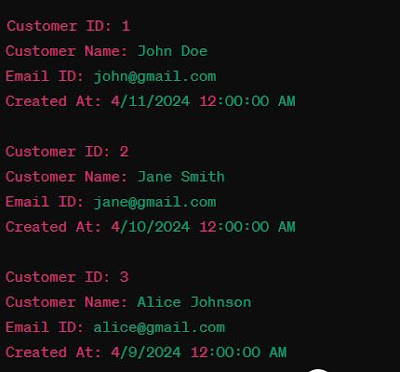In this post, we are going to provide possible solutions for How To Convert Dynamic To List<dynamic> In C#, you can try below approach, to convert a dynamic variable to a list of dynamic objects (List) in C#, explained with code examples:
using System;
using System.Collections.Generic;
class Program
{
static void Main(string[] args)
{
// Assume we have a dynamic variable containing some data
dynamic dynamicVariable = GetDynamicData();
// We want to convert this dynamic variable to a list of dynamic objects
List<dynamic> dynamicList = ConvertToDynamicList(dynamicVariable);
// Now, we can use the dynamicList for further processing
foreach (var item in dynamicList)
{
// Example: Accessing dynamic properties
Console.WriteLine($"Dynamic property: {item.PropertyName}");
}
}
// Example method to retrieve dynamic data
static dynamic GetDynamicData()
{
// Assume we fetch dynamic data from somewhere
dynamic data = new List<dynamic>
{
new { PropertyName = "Value 1" },
new { PropertyName = "Value 2" },
new { PropertyName = "Value 3" }
};
return data;
}
// Method to convert dynamic variable to List<dynamic>
static List<dynamic> ConvertToDynamicList(dynamic dynamicData)
{
// Simply cast the dynamic variable to List<dynamic>
return (List<dynamic>)dynamicData;
}
}
We start by assuming we have some dynamic data stored in a dynamic variable (dynamicVariable) and we want to convert this dynamic variable to a list of dynamic objects (List<dynamic>).
We have defined a function ConvertToDynamicList that takes a dynamic parameter and returns a List<dynamic> and inside this method, we simply cast the dynamic variable to List<dynamic>. In the Main method, we shows the usage by retrieving dynamic data, converting it to a dynamic list, and then iterating over the list to access dynamic properties.
using System;
using System.Collections.Generic;
class Program
{
static void Main(string[] args)
{
// Assume we have dynamic data containing customer information
dynamic dynamicData = GetDynamicCustomerData();
// We want to convert this dynamic data to a list of dynamic objects
List<dynamic> dynamicList = ConvertToDynamicList(dynamicData);
// Now, we can use the dynamicList for further processing
foreach (var customer in dynamicList)
{
// Example: Accessing dynamic properties
Console.WriteLine($"Customer ID: {customer.Id}");
Console.WriteLine($"Customer Name: {customer.CustomerName}");
Console.WriteLine($"Email ID: {customer.EmailId}");
Console.WriteLine($"Created At: {customer.CreatedAt}");
Console.WriteLine();
}
}
// Example method to retrieve dynamic customer data
static dynamic GetDynamicCustomerData()
{
// Assume we fetch dynamic customer data from somewhere
dynamic data = new List<dynamic>
{
new { Id = 1, CustomerName = "John Doe", EmailId = "[email protected]", CreatedAt = DateTime.Now },
new { Id = 2, CustomerName = "Jane Smith", EmailId = "[email protected]", CreatedAt = DateTime.Now.AddDays(-1) },
new { Id = 3, CustomerName = "Alice Johnson", EmailId = "[email protected]", CreatedAt = DateTime.Now.AddDays(-2) }
};
return data;
}
// Method to convert dynamic variable to List<dynamic>
static List<dynamic> ConvertToDynamicList(dynamic dynamicData)
{
// Simply cast the dynamic variable to List<dynamic>
return (List<dynamic>)dynamicData;
}
// Customer model class
public class Customer
{
public int Id { get; set; }
public string CustomerName { get; set; }
public string EmailId { get; set; }
public DateTime CreatedAt { get; set; }
}
}
In this example ,we define a Customer model class with properties Id, CustomerName, EmailId, and CreatedAt and then we fetch dynamic customer data using the GetDynamicCustomerData method, which returns a dynamic list containing customer information.
and then we are converting the dynamic data to a list of dynamic objects using the ConvertToDynamicList method and we iterate over the dynamic list and access the customer properties dynamically to print in console.
Read Similar Articles
- Implementing Dependency Injection With A Static Logger In C#
- Converting Byte Array to IFormFile in C# .NET Core
- How To Convert Newtonsoft.Json.Linq.JArray To a List Of Object Type In C#
- [Fixed] FileSystemException: Cannot retrieve length of file, path ='...' (OS Error: No such file or directory, errno = 2)
- Convert RSA public key to string using BouncyCastle C#
- C# : How To send '&' ,''+' Passing Special Character In Content body With HttpWebRequest of Type "application/x-www-form-urlencoded"
